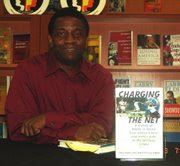

Having grown up during the television age, I have been genuinely surprised to meet people who say they don’t have a television in their home and don’t want one.
Not anymore.
Not after another weekend of sampling the vulgarity, coarseness and incivility that passes for entertainment on TV.
Indeed, if I was not a sports author and journalist who enjoys watching athletes, I would be accepting offers for my 25-inch set right now.
Channel-surfing last Saturday night while waiting for ESPN’s coverage of Australian Open tennis, I came upon “Harry’s Law,” an NBC series starring Oscar-winner Kathy Bates as a fired corporate lawyer who opens her own practice in a hardscrabble section of Cincinnati.
In this episode, Bates’s character, Harriet (nicknamed “Harry,” hence the title), tells an opposing attorney that a jury would be more inclined to rule for her client instead of his because, “You’re an a**hole.”
The obscenity was uttered so casually, so quickly, there would have been no time to cover the ears of a child who doesn’t deserve such an assault to the ears and senses.
Don’t get me wrong. I’m no prude. I was a huge fan of “The Sopranos” during its six-season run on HBO. It was one of the best-acted, best-written shows in television history.
However, the profanity, nudity and whackings in Tony Soprano’s world were expected.
And HBO is a premium channel, so you know what you’re paying those extra dollars for.
But nobody watching NBC at 8:16pm on a Saturday night should expect to hear one character on a drama series call another “an a**hole.”
Whatever happened to the family hour? Remember when the networks told us the period from 8pm-9pm Mondays through Saturdays and 7pm-9pm on Sundays were reserved for family entertainment?
Has the concept of non-offensive, family-oriented nightly entertainment on over-the-air television become as antiquated as the rabbit-eared antenna?
Do TV network honchos really believe that only vulgarity sells? That only a show with characters saying crude things to each other can be “edgy” and “hip”?
Is that why Kathy Bates is allowed to speak from the gutter in prime time?
Is that why “stinks” has been replaced by “sucks” in commercials and on TV series?
Is that why Fox Sports commentator Terry Bradshaw could say “sc*mbags” on a Sunday afternoon football show earlier this month and face no consequences?
Is that why CBS now presents a prime-time sitcom called “S**t My Dad Says”?
Is this what CBS, NBC, ABC, Fox, WB and UPN think they have to do to compete with the brain-numbing boorishness of shows like “
Much of television today resembles a warped game of limbo in which the overriding question is, “How low can you go?”
Low enough to compel many viewers to become far more discerning about what they watch and when—or join the growing ranks of those who use a television only to watch DVDs while ignoring network shows altogether.




